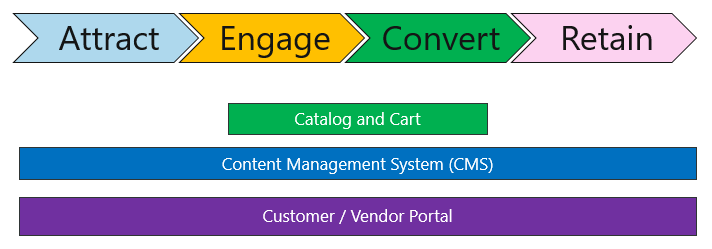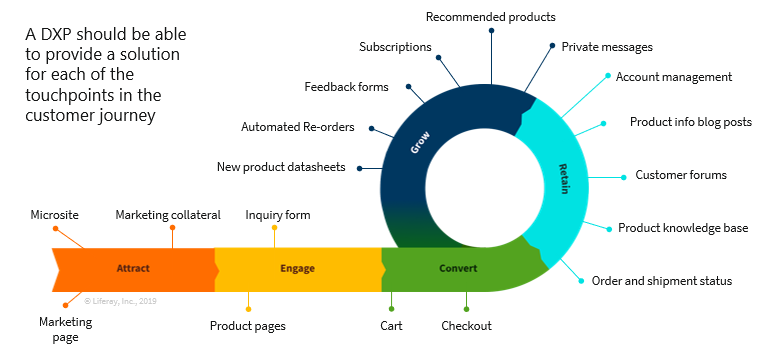B2B e-commerce continues to grow. Since 2018, electronic channels have accounted for over 50% of business to business transactions and over $1 trillion dollars in sales. Over 75% of distributors and wholesalers that are not doing e-commerce today plan to operate an e-commerce store within the next two years.
B2B buyers are evolving in their needs. Today they want a highly personalized shopping experience, they want it omnichannel, with 24/7 access to vendors – just like they experience with their personal buying at home. This represents a big change for traditional B2B sellers who have relied on a direct sales team to represent their goods and services. Now is the time to augment the sales team with an e-commerce channel, to truly service the customer.
Does Customer Experience Matter in B2B?
By the end of 2020, customer experience will overtake price and product as the key brand differentiator. Even though historically, B2B ratings for customer experience are far lower than their B2C counterparts, this can no longer be the case.
B2B buyers say they are willing to pay more for a great experience. They want a relevant, smart, and engaging buying experience. According to a Forrester report, “More than 60% of buyers now say sellers who are knowledgeable and address their needs have the most positive impact on their buying decisions.” This is especially true for businesses selling commodity products as the experience is often the only key differentiator. B2B customers have higher expectations than ever and they feel that many of their suppliers are falling far short of expectations. Yet, many B2B sellers are still struggling to deliver the experiences that their buyers are looking for.
Is “Shopping” The Entire Experience?
When talking about enhancing the B2B buying experience, people typically focus on the buying portion of the experience – search, catalog, cross-sell, upsell, quoting, etc. This is, of course, the main point – getting someone to buy something, but for the customer this is just one step in the overall journey. There are at least four stages in a typical customer journey: Attract, Engage, Convert, and Retain. The buying experience only covers two of those stages: Engage and Convert. To deliver the complete digital experience during a customer journey we must address all four phases.
Personalized Experience
The key to delivering the optimum experience during the Attract phase is personalization. B2B buyers surveyed in the Salesforce research rated personalization as a key differentiator in their buying experience. Over 60% of buyers have switched vendors when provided a more “consumer-like” experience. B2B buyers are expecting vendors to help guide them in their quest for products and services, rather than just present random products and hope for a match. To this end, we must understand why a buyer is visiting the site and then present content and products that are tailored to their interests and requirements.
B2B Buying Is Typically A Team Effort
Additionally, unlike in B2C situations, salespeople play a major role in B2B purchases. Sellers can create tailored microsites that are focused on a solution to help salespeople drive engagement during the Attract phase. Since there are usually multiple team members involved with a B2B purchase, it’s critical that the messaging in these sites are also personalized and relevant for the buyer.
Being able to digitally move the ball forward during this first phase means less cycles for the direct sales team and fulfills the buyer’s experience expectations.
Delivering the Right Content
In order to deliver a personalized experience in the Attract phase, and even through the Engage, Convert, and Retain stages, a robust content management system (CMS) must be part of the solution. CMS functionality allows your digital presence (web copy, promotions and in-store signage, blogs, whitepapers, tutorials, etc.) to be easily updated and personalized based on the interest scores of customers. With this analysis, customers can be exposed to content that is of interest to them based on their browsing habits and buying history, as opposed to generic content. This makes the buyer feel like their vendor knows and values them.
Post-Sale Customer Service is Part of the Journey
B2B sellers should not view customer service as an expense. Rather, customer service should be a critical component of digital transformation. Excellent customer service is another opportunity to engage with the customer, create loyalty, and present new products and services.
What should excellent customer service look like?
Customers expect to have questions answered 24/7, along with access to documentation (manuals, MSDS, certifications, videos), and they expect it to be easy to find information and filter documents to get exactly what they need. B2B customers also expect to be able to post service requests at any time and track the progress of those requests. In addition, they want to be able to change the type of interactions, frequency, and other post-transaction interactions digitally.
While it would be impossible to grant access to a variety of different back-end systems directly, a digital portal makes it possible to expose points of interaction to customers in a secure way. “Single Sign On”, or the ability to log in once to a website and automatically be logged into multiple back-end systems, is a key enabler for unifying the customer experience and digitally enabling the Retain phase of the customer journey.
The Right Technology for the Complete Customer Journey
To recap, customers need to digitally engage with vendors throughout their entire journey, from Attract to Engage, Convert, and Retain. B2B sellers who can provide the optimal journey in all phases are in the best position to expand their customer base and generate additional sales from current customers. The following key technology platforms are needed to enable this journey:
- A B2B ecommerce platform with support for B2B specific features like pricing tiers, custom quoting, self-service, invoicing, complex workflows, permissions, and security
- A content management system with support for scoring and tracking customer interactions and then delivering personalized content on-demand
- A customer portal for allowing the customer to engage with back-end systems post-sale as well as providing 24/7 access to documentation and support
This technology can be purchased independently, in a “best of breed” manner, and then hopefully integrated together, but an alternative, and better strategy, would be to purchase a single, end-to-end, integrated solution like Liferay.
Liferay Handles the Complete Journey
By leveraging Liferay Digital Experience Platform (DXP), companies can deliver complete digital customer experiences in the B2B space. Liferay’s open source platform delivers personalized content, B2B selling features, and robust portal and integration options. When evaluating different technology options, consider that the Liferay solution can do it all.
Bill Dunn is the President of Dunn Solutions, a Liferay Gold Service Provider Partner.
Dunn Solutions is a digital commerce agency, ready to partner with companies to create the best experiences for their B2B commerce customers. Send an email to [email protected] to start the discussion.




